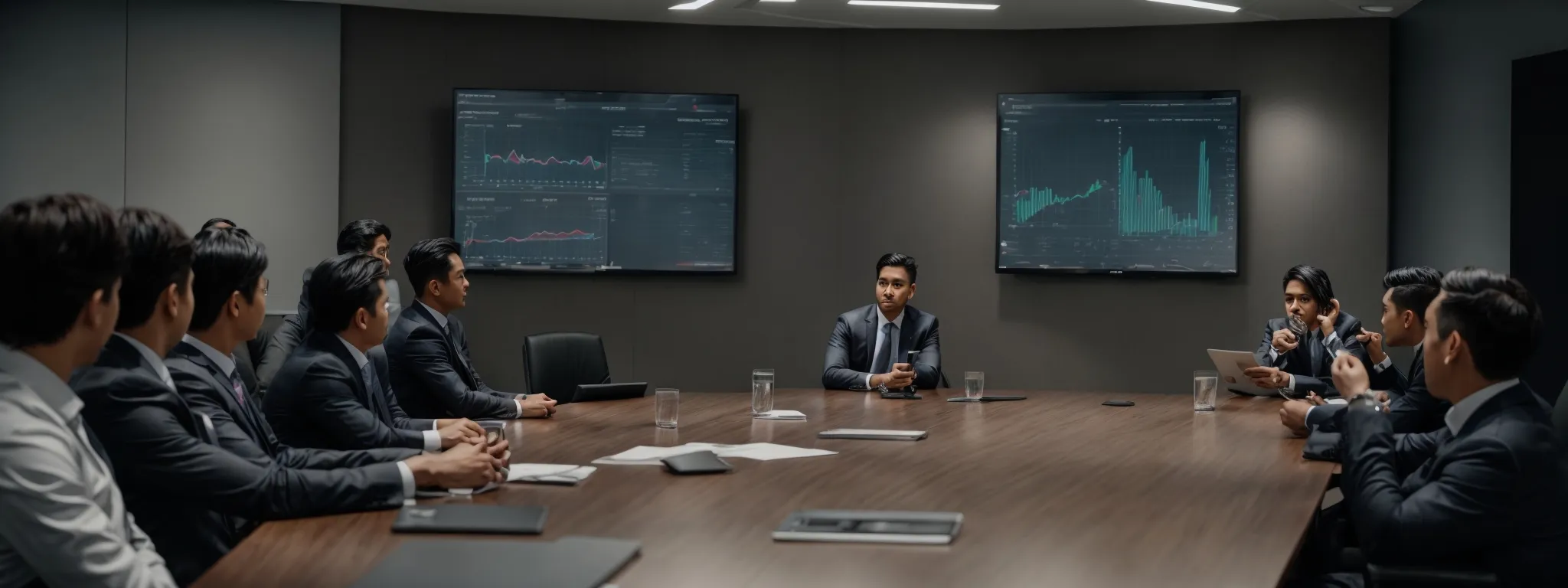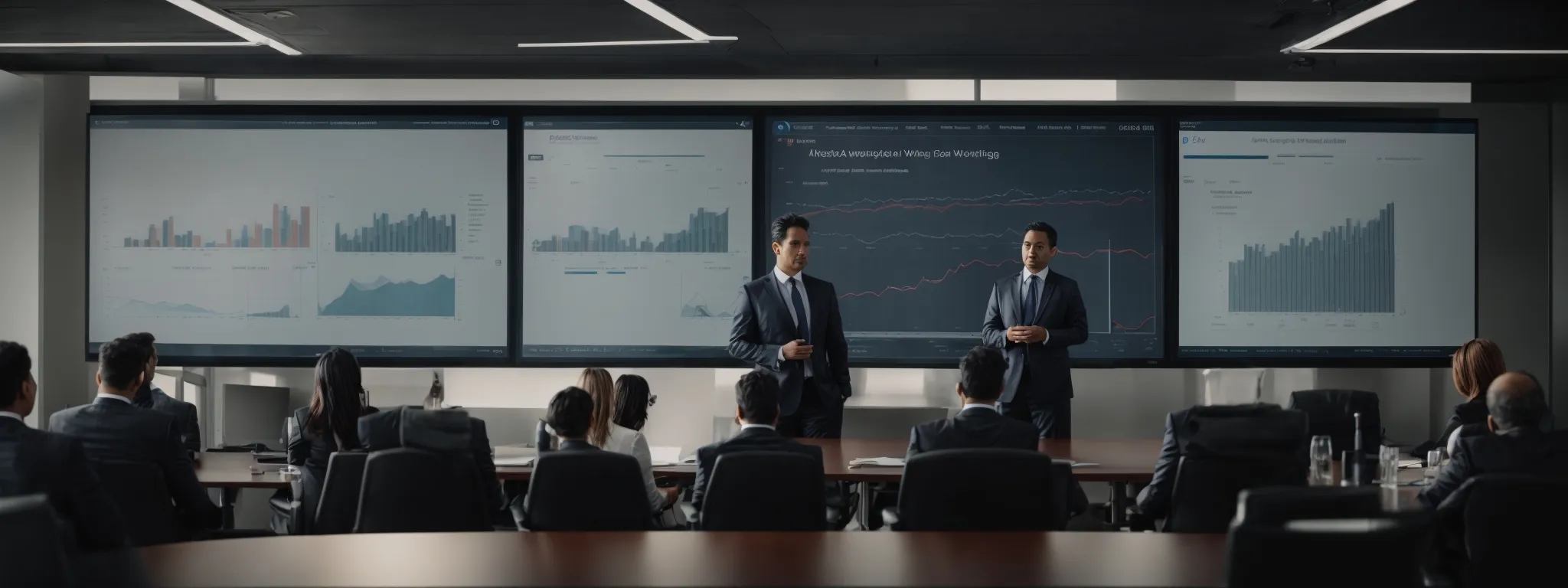CEO Guide to SEO
CEO’s Strategic Blueprint for Mastering SEO In the dynamic realm of digital transformation, CEOs are recognizing the pivotal role of search engine optimization (SEO) in steering a […]
CEO’s Strategic Blueprint for Mastering SEO
In the dynamic realm of digital transformation, CEOs are recognizing the pivotal role of search engine optimization (SEO) in steering a company’s online presence and bolstering growth.
As the architect of a brand’s success, a CEO must craft a comprehensive SEO strategy that intertwines technical acumen with creative content marketing.
Pioneering this endeavor demands not just fleeting familiarity but deep engagement with SEO best practices and adaptive measures that resonate with the ever-evolving online user experience.
This strategic blueprint unveils the methodologies, from leveraging potent SEO tools like LinkGraph’s Search Atlas to fostering a culture soaked in SEO wisdom, that can propel an organization to the pinnacle of organic search results.
Keep reading to unlock the tenets of SEO mastery that can transform CEOs into champions of search engine dominion.
Key Takeaways
- CEOs Play a Pivotal Role in Aligning SEO With Business Goals and Fostering a Culture of Continuous Optimization
- Strategic SEO Involves Not Only Technical Optimization but Also Consistent Content Quality and Understanding of User Search Behavior
- Engagement With Specialized SEO Agencies Like LinkGraph Can Provide the Expertise and Cutting-Edge Tools Like Search Atlas for Superior SEO Performance
- A Proactive Approach to SEO Ensures Companies Adapt Quickly to Algorithm Updates and Maintain a Competitive Stance in Search Rankings
- Effective SEO Requires the Involvement of All Company Departments, Continuous Learning, and Anticipation of Future Search Engine Dynamics for Long-Term Digital Success
Crafting an SEO Vision as a CEO

In the fast-paced panorama of search engine landscapes, chief executives shepherd their brands through the digital transformation with a keen eye on SEO as an integral part of their business strategy.
The task at hand is not merely about elevating a website’s visibility but entwining search engine optimization with the core business goals to forge a roadmap for sustained digital success.
The challenge multiplies as these leaders distill the essence of SEO into actionable visions and communicate its critical role in driving growth and engagement to their stakeholders.
For a CEO, mastering SEO is more than a technical undertaking; it’s about embedding it into the very fabric of a company’s narrative and guiding principles.
Aligning SEO Goals With Business Objectives
For CEOs, weaving SEO into the tapestry of company objectives translates into aligning the nuances of search engine optimizers with overarching business aims. A keen approach to SEO strategy melds user experience with desired outcomes, ensuring that every increase in website traffic is not just a count, but a step towards revenue and reputation growth.
By harmonizing SEO efforts with the company’s growth trajectory, business leaders can elevate SEO from a channel of marketing to a channel of business intelligence. The results: improved search rankings become signposts to strategic victories, and enhanced visitor engagement spells out competitive advantage.
- Determine SEO outcomes that resonate with business KPIs.
- Create a unified vision for SEO and business growth.
- Translate technical SEO achievements into business benefits.
Incorporating SEO Into Company Vision Statements
Integrating search engine optimization into a company’s vision statement propels a brand’s commitment to digital excellence. It transcends traditional marketing paradigms, embedding a determination to not only appear in search but to meaningfully connect with searchers through the clamor of the digital marketplace.
A visionary SEO statement enthuses every team member, from developers to content creators, to prioritize user journeys in the digital sphere. This alignment serves as a compass for employees, guiding their daily endeavors toward impactful online visibility and a seamless visitor experience.
| SEO Dimension | Business Objective | Company Vision |
|---|---|---|
| User Experience | Customer Satisfaction | A commitment to being the benchmark of customer engagement in the digital landscape |
| Organic Search Presence | Market Penetration | Fostering a brand synonymous with industry leadership through strategic online discovery |
| Technical SEO | Operational Excellence | Ensuring a robust digital platform that is the bedrock for seamless and innovative user interactions |
Communicating the Importance of SEO to Stakeholders
Engaging stakeholders in the narrative of search engine optimization necessitates a clear elucidation of its impact on the company’s bottom line. CEOs must articulate how SEO efforts align with the firm’s accomplishments, emphasizing the symbiosis between organic search results and tangible business outcomes.
It is essential for the CEO to bridge the knowledge gap, demonstrating to stakeholders how strategic SEO leads to a formidable online presence that catalyzes brand authority and fuels long-term growth:
| Stakeholder Role | SEO Importance | Business Impact |
|---|---|---|
| Investors | Drive for sustainable organic search traffic | Strengthening of shareholder value through increased market reach |
| Marketing Executives | Alignment of content strategy with user intent | Greater lead generation and conversion rates |
| IT Department Heads | Implementation of robust technical SEO practices | Enhanced website performance and user satisfaction |
Building a Robust SEO Foundation for Success

As a CEO navigates the competitive terrain of the search engine market, laying a solid SEO foundation is paramount for long-term digital success.
By grasping the pillars of SEO strategy, a leader can establish a mindset that appreciates the intricacies of search engine optimization and its cumulative effect over time.
A structured SEO plan allows for the detailed orchestration of technical, content, and user experience enhancements, bolstering a brand’s authority and presence in organic search results.
Hence, CEOs must harness the power of SEO to construct a blueprint that secures the company’s digital future.
Understanding the Pillars of SEO Strategy
A CEO’s grasp of the triad of SEO pillars – technical optimization, content excellence, and link building – becomes the cornerstone of their marketing and operational prowess. Acumen in SEO enables not only improved rankings but also fosters trust and authority, both in the eyes of search engines and the intended audience.
Mastering these pillars demands that leaders invest in sophisticated SEO tools and partner with seasoned search engine optimizers who can illuminate the path to organic growth. LinkGraph’s SEO Services, for instance, epitomize the fusion between advance analytics and tailored strategies, orchestrating a symphony of technical precision and content relevance that addresses the searcher’s intent and bolsters a brand’s digital footprint.
Establishing a Long-Term SEO Mindset
For CEOs, adopting an SEO mindset establishes the prudence needed in the marathon of digital marketing: a course set on long-term achievements rather than transient victories. This perspective entails recognition of SEO’s compound effect, where strategic tweaks and content enhancements accrue value over time, contributing to a resilient online authority.
Instilling such a mindset within the organization paves the way for sustainable practices that stand the test of algorithm updates and market shifts. It reinforces the value of consistency in SEO practices and the anticipation of evolving user behaviors, ensuring the business adapts and thrives in the dynamic search landscape.
- Advocate for ongoing SEO education and agility within the leadership cadre.
- Implement continuous SEO monitoring and iterative improvements as part of the business process.
- Foster an environment where each department contributes to and benefits from the company’s SEO initiatives.
Developing a Structured SEO Plan
Developing a structured SEO plan necessitates a strategic choreography that aligns search engine optimization initiatives with the broader strokes of business objectives. CEOs must prioritize a meticulous approach that ensures all SEO actions, from keyword research to link building, are precisely aligned with the company’s growth vision.
It calls for an insightful allocation of resources to various facets of SEO, such as technical audits, content creation, and user experience enhancement. This structured approach equips a CEO with a roadmap that leverages SEO best practices to maximize organic search presence and drive meaningful business outcomes.
Setting the Course With Competitive SEO Analysis

Embarking on the path of competitive SEO analysis equips CEOs with critical insights to chart their company’s course in the dense forest of the digital marketplace.
This analytical approach demands a discerning evaluation of the competitive landscape, identifying not just direct competitors but also the SEO strategies they employ that yield success.
By establishing benchmarks, leaders set realistic and aspirational targets, creating a barometer against which their own SEO campaign’s progress is measured.
Such intelligence is fundamental in crafting a robust SEO blueprint that propels a brand’s visibility and competitive edge in the search engine result pages (SERPs).
Identifying Your SEO Competitors
Carving out a competitive edge in the search engine arena begins with identifying who your real adversaries are. CEOs must discern which organizations are occupying the top spots in the Google search results for keywords critical to their own brand’s relevance.
With a crystal-clear view of the competition, a company can tailor its SEO efforts more effectively, honing in on the strengths and weaknesses of rival entities. This, in turn, establishes a benchmark against which the company can measure the success of their own SEO strategies:
| Aspect of Analysis | Competitor Benchmark | Company Strategy |
|---|---|---|
| Keyword Rankings | Competitor’s top-performing keywords | Tailored content creation to target keyword gaps |
| Backlink Profile | Strength and diversity of competitor’s backlinks | Enhanced link acquisition to boost domain authority |
| Content Quality | Benchmark of competitor’s content engagement metrics | Development of superior content to surpass engagement standards |
| Site Structure | Comparison of competitor’s site usability and technical SEO | Optimization of site architecture for improved user experience |
Learning From Competitors’ SEO Strategies
Deriving insights from competitors’ SEO strategies enables CEOs to decipher the intricate puzzle of search engine algorithms and user preferences. Thorough analysis reveals the nuances of content strategy and technical SEO that allow competitors to secure coveted spots in search results, providing a detailed map for a company to navigate its own SEO journey.
In the game of digital positioning, what sets a company apart often lies in understanding the successful maneuvers of its competitors. CEOs must distill strategic gems, such as the efficacy of competitors’ anchor text distribution or the ingenuity of their content marketing, into actionable intelligence that refines their own brand’s SEO campaign.
Establishing Benchmarks for SEO Success
In the realm of SEO supremacy, CEOs determine the markers of success by establishing benchmarks that reflect both industry standards and unique corporate goals. These benchmarks serve as the North Star for a company’s SEO voyage, guiding SEO experts as they calibrate tactics and strategies to outshine competitors and captivate their target audience.
Key performance indicators such as page ranking for priority keywords, website loading speed, and user engagement metrics are pivotal in measuring a brand’s SEO performance. By setting clear and quantifiable objectives, a CEO can track the efficacy of SEO initiatives, ensuring that every effort is purposeful and aligned with the overarching mission of the organization.
Resourcing for SEO: In-House Team or Agency?

A critical decision for CEOs charting the course of a company’s SEO trajectory is whether to cultivate an in-house team or engage the expertise of a specialized SEO agency.
This choice is not merely operational but strategic, impacting the efficiency, scalability, and ultimately, the success of a company’s search engine optimization endeavors.
While an in-house team offers dedicated focus and a potentially seamless integration with the company’s culture, an SEO agency brings to the table a breadth of experience and a diverse skill set, often essential to navigate the intricacies of the SEO industry.
The deliberation extends to understanding the benefits and limitations of each option, discerning the elements that influence the selection of an agency, and optimizing the structure of an internal team to meet the ambitious demands of online search competitiveness.
Evaluating the Pros and Cons of an in-House Team
In determining the SEO pathway for a company, chief executive officers weigh the merits of cultivating an in-house team against outsourcing to an established agency. An internal team provides the advantage of deep immersion in the brand’s ethos, allowing strategies to be intricately aligned with company values and culture.
However, the challenge with an in-house setup lies in the potential limitations in SEO expertise and the resources required for continuous professional development. Business leaders must consider the trade-off between the tailored focus an internal team brings and the expansive, up-to-date knowledge that an external SEO agency can offer.
Factors to Consider When Selecting an SEO Agency
In the voyage of appointing a proficient SEO agency, chief executives must appraise the agency’s proven track record and the extent to which its approach aligns with the company’s digital objectives. They must vet not only the agency’s ability to deliver measurable SEO results but also its capacity to coalesce seamlessly with the brand’s unique ethos and vision.
Another pivotal factor is the agency’s adeptness in embracing the rapidly evolving SEO landscape, which includes algorithmic changes and user behavior shifts. Executives should ensure that the selected SEO partner, such as LinkGraph, is not just current with trends but also anticipates future developments, positioning their company at the forefront of organic search innovation.
How to Structure an Internal SEO Team Effectively
An internal SEO team’s architecture benefits immensely from a multi-disciplinary approach, where individuals bring specialized skills in areas such as technical SEO, content strategy, and link acquisition. CEOs must amplify the team’s effectiveness by appointing a leader who not only embodies a deep understanding of SEO but also demonstrates the capacity to merge this expertise with the brand’s broader objectives.
Efficiently structured, a cohesive internal team capitalizes on immediate communication and company-specific knowledge to swiftly navigate SEO challenges and opportunities. Organizing the team with clear roles and collaborative processes fosters an environment where innovative SEO strategies are born from the collective intelligence and tailored to the unique digital footprint of the company.
Leading the Charge in Content and Keywords

In a digital era where content reigns supreme, chief executive officers are central to devising a strategic plan for content and keyword optimization that aligns with the broader corporate objectives.
The CEO’s foresight into crafting a content strategy underpins the importance of selecting the right keywords and ensuring content quality, ensuring it resonates with both the brand’s voice and the needs of the target audience.
An astute CEO understands the power wielded by compelling and relevant content in differentiating their company in the congested marketplace of ideas and in organic search results, thereby charting a trajectory for enduring success and thought leadership.
The CEO’s Role in Shaping Content Strategy
At the helm of content strategy, a CEO ensures that messaging and keywords are meticulously chosen to champion the brand’s voice and the audience’s intent. This oversight is crucial in fostering a content ecosystem that not only captures organic search success but also drives meaningful connections with visitors.
Such leadership in crafting a content strategy means shaping narratives that elevate the company’s subject matter authority while simultaneously optimizing for search engines. The CEO’s strategic content decisions serve as the linchpin in balancing compelling narratives with SEO imperatives, to achieve a harmonious synergy that propels the brand forward.
Mastering Keyword Research and Selection
A strategic leader recognizes the linchpin role of keyword research in sculpting a company’s content and SEO strategies. The CEO, versed in the nuances of keyword selection, directs the focus towards terms that not only draw a clear line to the brand’s unique offerings but also resonate with the searching behaviors of the audience.
Through the astute analysis of keyword performance data and trend projections, CEOs ensure their company’s content aligns with the queries their potential customers are posing to search engines. This alignment is key in bridging the gap between audience needs and the company’s message, all while enhancing visibility in the digital expanse of organic search results.
Emphasizing Content Quality and Relevance
In their commitment to excellence, CEOs recognize that the crux of a thriving SEO campaign lies in the unwavering emphasis on content quality and relevance. High-caliber website content not only fuels search engine rankings but also fortifies trust among customers, reinforcing the brand’s authority in its niche.
Stewarding a company’s content narrative, the astute CEO ensures every piece of content disseminated is thoughtfully curated to match the searcher’s intent, thereby amplifying the resonance and impact of the brand’s message within the search results page.
Embracing Technology in SEO: Tools and Platforms

In an age where technology dictates the pace of market dynamics, CEOs recognize the transformative power of innovative SEO tools and platforms in shaping their company’s digital trajectory.
These technological assets serve as the navigational instruments for data-driven decisions, enhancing the efficiency of platform integration, and keeping the organization abreast with the ever-evolving SEO technology trends.
By strategically leveraging such tools, leaders are adept at pinpointing areas of optimization, streamlining operational workflows, and adapting to shifts within the search engine landscape, all of which are instrumental in reinforcing a brand’s online authority and market position.
Leveraging SEO Tools for Data-Driven Decisions
CEOs understand that in the domain of SEO, informed decision-making is underpinned by the use of sophisticated tools capable of mining deep insights from vast amounts of data. With these applications at their disposal, leaders dissect the nuances of search engine algorithms and refine SEO strategies with precision and foresight.
Deploying SEO platforms, such as LinkGraph’s Search Atlas, equips executives with real-time analytics, enabling them to monitor their SEO performance meticulously and adjust tactics responsively. This technological edge crystallizes visions into measurable outcomes, charting a data-driven course that aligns with the company’s ambitious growth imperatives.
| SEO Tool Features | Data Insights Offered | Strategic Decisions Enabled |
|---|---|---|
| Keyword Performance Tracking | User Search Trends & Keyword Viability | Content Optimization & Market Positioning |
| Competitor Analysis | SEO Benchmarking & Competitor Strategies | Targeted Campaign Enhancements & Gap Identification |
| Backlink Monitoring | Backlink Quality & Domain Authority | Refined Link Building & Authority Development |
Platform Integration for Maximum SEO Efficiency
For a CEO, the integration of SEO platform capabilities into existing business systems embodies strategic optimization at its finest. This convergence ensures that SEO tools amplify the company’s operational proficiency, forging an environment where data transfer and actionability operate without silos or friction.
- Unifying analytics and marketing platforms for cohesive insights.
- Automating SEO tasks to accelerate execution and productivity.
- Ensuring real-time data synchronization across departments for informed decision-making.
By employing platforms that align with other business systems, leaders ensure that SEO strategies are cohesively woven into all facets of the organization. Such integration underpins an efficient workflow, where insights gleaned from SEO tools seamlessly trigger relevant actions across marketing, sales, and customer service channels.
Staying Updated With SEO Technology Trends
CEOs acknowledge that the landscape of SEO is in a state of perpetual evolution, with new technological trends emerging that could reshape the effectiveness of current strategies. Astute leaders are attuned to these shifts, staying informed about developments in artificial intelligence, voice search optimization, and mobile-first indexing, which are crucial for maintaining a competitive edge in search engine rankings.
Such vigilance in tracking SEO technology trends ensures that companies are quick to adopt innovative practices that improve their organic search presence. Savvy executives champion the early adoption of promising tools and methodologies, cognizant that a delay in embracing these advancements can lead to lost opportunities in search result prominence and audience engagement.
Measuring SEO Success: Metrics That Matter

In the intricate dance of digital dominance, a CEO’s arsenal is incomplete without the astute analysis of SEO metrics that illuminate the path to triumph.
These metrics, when judiciously selected and meticulously scrutinized, offer a lighthouse for navigating the turbulent seas of search engine rankings.
Within this strategic context, understanding the value of Key Performance Indicators for SEO Progress, interpreting vast SEO data for cogent strategic decisions, and proficient reporting of SEO milestones to the executive board stand as critical components that shape the narrative of a brand’s journey towards measurable, long-term online success.
Key Performance Indicators for SEO Progress
Within the ambit of search engine optimization, capturing the essence of progress pivots on the clear definition and careful monitoring of Key Performance Indicators (KPIs). For a CEO, these indicators offer the macroscopic view of their brand’s SEO fruition, shedding light on aspects like search ranking positions, organic traffic volumes, and bounce rate trends—metrics that are imperative to the calibration of their ongoing SEO strategies.
Leaders in the corporate sphere appreciate KPIs as instrumental signposts that guide the incremental refinement of optimization efforts. By measuring the lift in organic search performance against predefined goals, such as enhanced click-through rates and improved SERP features visibility, chief executives maintain a pulse on their brand’s digital health and the success of their SEO investments.
Interpreting SEO Data for Strategic Decisions
Chief executives must evaluate the vast expanse of SEO data with a strategic lens, transforming raw analytics into actionable intelligence. They discern patterns and anomalies that inform strategic pivots, positioning their company to capitalize on emerging opportunities or to avert digital pitfalls.
This proactive interrogation of SEO data affirms a company’s direction, empowering leaders to orchestrate SEO endeavors with surgical precision. It is in analyzing trends over time that SEO’s contribution to corporate objectives becomes clear, enabling executives to optimize their brand’s digital footprint for maximum impact and ROI.
Reporting SEO Wins to the Executive Board
For CEOs, articulating the triumphs of SEO to the executive board is paramount to validating strategic investments and fostering organizational support. This presentation requires distilling complex analytics into compelling narratives that spotlight significant growth in search rankings, organic traffic, and conversion rates, directly correlating SEO efforts with overarching business objectives.
Effective communication of these SEO achievements acknowledges the collaborative triumphs across departments and serves as an impetus for continued investment in SEO initiatives. It underscores the tangible benefits realized from SEO, thereby reinforcing the integration of search engine optimization as a cornerstone of the company’s growth strategy and digital market leadership.
Cultivating a Culture of SEO Excellence

In the grand tapestry of corporate growth, the role of a chief executive officer extends beyond steering the company’s strategic direction to fostering an environment where search engine optimization is revered as a critical component of success.
A CEO’s commitment to ingraining a culture of SEO excellence within the fabric of the organization heralds a new era where learning, recognition, and collaboration around SEO are not just encouraged but deeply integrated across all departments.
This cultivation of an SEO-centric mindset empowers teams to synergize, initiate dialogues that spur innovation, and weave SEO best practices into the very DNA of the company’s operations, thus reinforcing the collective endeavor to excel in the competitive digital landscape.
Encouraging SEO Learning Across Departments
In recognizing the multifaceted nature of SEO, CEOs catalyze interdisciplinary involvement by promoting SEO education throughout the organization. By underscoring the role of search engine optimization in every aspect of the company’s online presence, from technical infrastructure to content creation, leaders inspire a unified effort to elevate the brand’s digital prowess.
Forward-thinking executives champion a proactive knowledge-sharing environment where insights into SEO best practices permeate various departmental strategies. This approach ensures that every team member, regardless of role, appreciates the impact of their contributions on the company’s overarching SEO objectives, fostering an organizational ethos of collective responsibility in digital success.
Recognizing and Rewarding SEO Successes
In the quest for SEO excellence, a CEO’s recognition of the strides made in search engine optimization plays a pivotal role. By celebrating the SEO milestones achieved, they reinforce the message that these efforts are vital to the brand’s success.
When a company’s SEO strategy leads to substantial achievements like a surge in organic traffic, higher search engine rankings, or increased conversion rates, it’s crucial for executives to acknowledge and reward these wins. Public appreciation not only acknowledges the direct contributors but also motivates the wider organization to strive for SEO excellence:
- Annual awards within the company for innovative SEO strategies that yield notable results.
- Inclusion of SEO successes in organizational newsletters, highlighting the team’s effort and impact.
- Investment in professional development opportunities for team members who demonstrate an exceptional understanding and application of SEO best practices.
Fostering Cooperation Between SEO and Other Teams
For CEOs aiming to entrench SEO at the heart of corporate strategy, fostering cooperation between SEO specialists and other departments is indispensable. It necessitates the cultivation of cross-functional teams where SEO experts collaborate with product managers, sales teams, and customer service representatives to create a cohesive digital presence that reflects the brand’s values and drives consumer engagement.
Encouraging this synergy involves the CEO championing a shared vision that integrates SEO considerations into the workflow of each department. Regular interdepartmental meetings and unified project goals ensure that SEO practices are not relegated to a silo, but rather inform and enhance the company’s collective efforts, resulting in a unified and powerful online user experience.

In the relentless quest for digital supremacy, chief executive officers are tasked with charting a path through the maelicsmuggling SEO terrain, where algorithm changes are as constant as the northern star.
This journey predicates not just on the vigilance to capture the ephemeral SEO trends and updates but also on the strategic foresight to imbue the organization with an SEO resilience capable of withstanding the vicissitudes of search engine algorithms.
As CEOs marshal their teams into this dynamic fray, they shoulder the responsibility of fostering agility and adaptability within their ranks—a readiness to evolve with the mercurial nature of SEO, ensuring their brand’s prominence in the search engine hierarchy remains unassailed.
Staying Ahead of SEO Trends and Updates
In the dynamic realm of search engine optimization, CEOs must proactively anticipate and embrace the continuous shifts that characterize SEO trends and algorithmic updates. Recognizing the influence of such changes on the search engine result page standings, visionary leaders ensure their SEO team is equipped with cutting-edge knowledge, thereby affirming their brand’s adherence to the latest industry standards while maintaining search relevance and user engagement.
By fostering an organizational culture that prioritizes agility in SEO practice, chief executives like those at LinkGraph spearhead the charge in preempting and responding to algorithmic evolutions. They invest in ongoing training and employ comprehensive SEO tools such as Search Atlas, which empower their team to implement swift adaptations to SEO strategies, securing the brand’s competitive stature in the ever-changing landscape of Google search results.
Developing Strategies for SEO Resilience
In the high-stakes arena of search rankings, CEOs must champion the development of robust SEO resilience strategies to mitigate the impact of search engine algorithm shifts. The key lies in nurturing a comprehensive understanding of both the search landscape and the company’s specific SEO needs, creating agility within the SEO blueprint to swiftly navigate and adapt to changes.
Chief executives at the helm of innovative firms like LinkGraph pave the way for SEO durability by embedding adaptability into their company’s ethos, fostering a culture where proactive adjustments to SEO tactics are not just a response but a regular aspect of their SEO playbook. Such forethought ensures that a brand’s SEO success is not at the mercy of algorithmic whims but continues to drive consistent search traffic and audience engagement regardless of the digital tides.
Training Teams to Adapt to SEO Evolution
Chief executive officers champion the cultivation of an adaptable environment, where learning is continuous and agility is paramount to a team’s success with SEO. By fostering this ethos, they ensure that their teams are not only receptive to new SEO methodologies but also proficient in integrating them into the company’s ongoing strategies.
Investment in regular training sessions and workshops exemplifies a CEO’s commitment to keeping the organization’s search engine optimization skills sharp and effective. As the search landscape evolves, such an approach ensures that a company’s SEO team remains adept at navigating the changing terrain, armed with the latest knowledge and techniques.
Sustaining Growth: SEO as an Ongoing Commitment

For CEOs committed to the digital expansion and longevity of their brands, the gravitas of SEO cannot be underestimated.
It is a cornerstone upon which online visibility and business success are built and maintained.
Thus, embedding a culture of ceaseless SEO enhancement, weaving optimization practices through the sinews of business development strategies, and prepping for the inevitable changes of search engine dynamics are critical.
Each of these facets underpins a philosophy that recognizes SEO not as a one-off project, but as a persistent pursuit synonymous with evolution—the kind that savvy chief executives enshrine in their blueprint for corporate mastery.
Prioritizing Continuous SEO Improvement
In the ever-evolving sphere of search engine optimization, CEOs play a pivotal role in ensuring that their organizations are not merely reacting to changes but are persistently refining and enhancing SEO practices. Prioritizing continuous SEO improvement requires a visionary approach to stay aligned with both technological advancements and shifts in user searching behavior.
Recognizing this, business leaders institute systems of accountability where progress is tracked against strategic benchmarks. Teams are empowered to not only achieve set targets but to routinely surpass them by leveraging the latest SEO insights and best practices:
| SEO Focus Area | Accountability Measure | Expected Outcome |
|---|---|---|
| Keyword Optimization | Monthly performance reviews | Continuous growth in target keyword rankings |
| Content Quality | User engagement analytics | Higher content relevancy and visitor retention rates |
| Technical SEO | Regular website audits | Advanced site functionality and user experience |
Moreover, fostering a culture of innovation within their organizations, chief executives ensure that SEO practices are not static but dynamic, ever-progressing with the competitive landscape of search engines. It’s this ongoing commitment that cements the brand’s digital presence and propels long-term business growth.
Integrating SEO Into Business Development Plans
CEOs understand that SEO is not just a marketing tactic but a strategic element integral to business growth. They ensure that SEO considerations are baked into the planning and execution phases of business development, with particular attention to how organic search can drive market expansion and product innovation.
Incorporating SEO from the onset of business development initiatives, CEOs align product launches and market entries with keywords and content strategies designed to capture and convert search traffic. This foresight allows for a seamless fusion of SEO objectives with long-term business planning, guaranteeing that the digital and development strategies resonate and bolster each other.
Preparing for the Future of Search Engine Evolution
As the architects of their company’s success, CEOs must foster a forward-looking mindset, anticipating future trends in search engine dynamics. By harnessing predictive analytics and SEO tools like Search Atlas, leaders ensure their brands remain agile, ready to adapt to new search algorithms and user searching patterns as they emerge.
Chief executives who position their organizations at the vanguard of search engine evolution continually cultivate adaptive strategies conducive to SEO resilience. Their foresight in integrating emerging technologies and learning about shifts in digital consumer behavior positions their companies not just to respond to future changes, but to actively shape their trajectory within the organic search landscape.
Conclusion
In conclusion, a CEO’s strategic blueprint for mastering SEO is crucial for the digital transformation and competitiveness of any brand.
It aligns SEO with core business objectives, ensuring that search engine optimization is not simply a marketing tool but a broad business intelligence strategy that drives growth and maintains relevance in a rapidly evolving digital marketplace.
A CEO’s adept understanding of the pillars of SEO, such as technical optimization, content excellence, and link building, empowers the organization to craft content that resonates with both search engines and the target audience.
By prioritizing a structured SEO plan, nurturing a culture of continuous improvement, and fostering adaptability, a CEO ensures that the organization stays ahead of SEO trends and updates, thus sustaining long-term growth.
Leveraging technology and tools enables data-driven decisions, while integrating SEO into all aspects of business development solidifies the organization’s market position.
The strategic blueprint underlines the importance of preparing for the search engine evolution, ensuring the brand’s capability to navigate and thrive in the complex dynamics of the digital realm.















































































